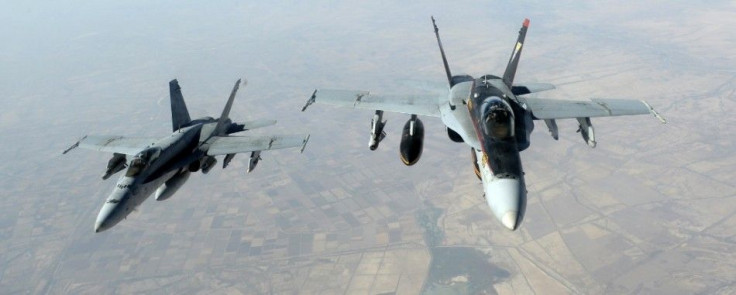Canada ISIS Mission: Drops 1st Bombs in Iraq

Canada has launched its first airstrike against the blood-hungry ISIS militants in Iraq, the Department of National Defence confirmed Sunday. The strike targeted an area near Fallujah city, a large city in central Iraq.
Defence Minister Rob Nicholson said in a statement two Canadian CF-18 fighter jets were used for the first mission. It dropped 500-pound laser-guided missiles on its target. The mission lasted approximately four hours, he added.
According to the portal aviationist.com, the aircraft that were used for Sunday's strike carried 3x GBU-12 LGBs (Laser Guided Bombs), 2x AIM-9M Sidewinder air-to-air missiles at the wing tip launchers, 1x AIM-120 AMRAAM (Advanced Medium Range Air-to-Air Missile) and 2x drop tanks.
They are part of a contingent of six CF-18s, two CP-140 Aurora surveillance aircraft and a Polaris that Canada had committed to provide when it announced its formal participation into the U.S.-led coalition early in October. The fighter planes are located in an undisclosed air base in Kuwait.
Rear Adm. John Kirby, Pentagon Press Secretary, meantime believed the results expected from the air power bombardment against the ISIS won't be immediately felt. It will "take some time to be able to show longer term strategic effects," Kirby told CTV's Question Period in an interview that aired on Sunday. He said the success of the mission of the U.S.-led coalition against the radical extremists will be deemed effective or has achieved its goal once it has demolished the "attractiveness of (the group's) warped, barbaric ideology." He noted what's most important is to terminate the group's ability to function.
"This isn't just about killing individuals," Kirby said. "This is about degrading and destroying the capabilities of this group to exist as an entity and to have the influence that they continue to have."
Apart from dropping the missiles, Canada's mission on Sunday also included air-to-air re-fueling from Canada's Polaris aircraft. Afterwards, Nicholson said all aircraft returned safely to base at Kuwait.
Canada's participation in the U.S.-led coalition, as what was approved by the House of Commons in October, will only last for six months and is only limited to airstrikes against ISIS targets in Iraq. The targets of Canada's aircraft are assigned by the Combined Air Operations Centre, which operates under U.S. Central Command.





















